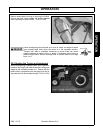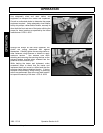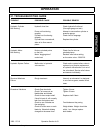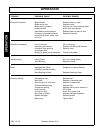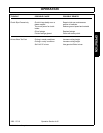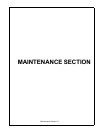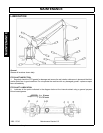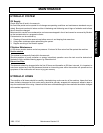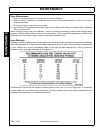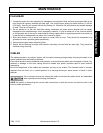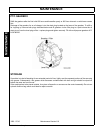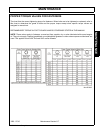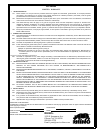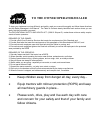
MAINTENANCE
1900 07/10 Maintenance Section 5-5
© 2010 Alamo Group Inc.
MAINTENANCE
FLAILHEAD
1. Frequently inspect the rotor assembly for damaged or missing flails. Bolts and nuts securing the flails to the
rotor should be regularly checked and kept tight. The correct torque setting for these locknuts is 135 Nm
(100 lbs/ft.). Use only the correct flail bolt and locking nut. Check the flail pivot bushes for possible damage
or wear. They do not require oil.
2. Do not attempt to run the rotor with flails missing. Imbalance will cause severe vibration and can rapidly
damage the rotor shaft bearings. As an emergency measure, if a flail is broken off or lost, remove another
on the opposite site of the rotor to retain balance. Always replace flails in opposite pairs and never match up
a new flail with a resharpened one which will of course be lighter.
3. Blunt flails absorb a lot of power and leave an untidy finish to work. They should be sharpened on a
grindstone or with a portable grinder periodically.
4. Wear protective gear when sharpening flails.
5. Ensure that the bearing housings and hydraulic mounting nuts and bolts are kept tight. They should be
checked during servicing.
CABLES
The cables operate on a push/pull system with the spool centering springs always returning the spool to the
neutral position when the handle is released.
Care should be taken during installation and operation to ensure that the cables are not trapped or kinked. Any
abrasion or damage to the outer casing should be sealed with plastic insulation tape to avoid moisture
penetrating.
No routine adjustment of the cables are necessary as they do not stretch. The threaded collar is correctly
adjusted when the lever is in a vertical position in its housing allowing an equal amount of travel in either
direction.
On no account should any attempt be made to lubricate the cables which are assembled
with a special lubricant during manufacture.
NOTE: Be careful in determining the correct cable connections on both the control unit and the valve in the
event of cable replacement.



